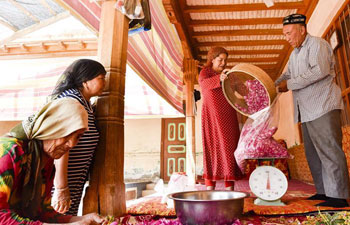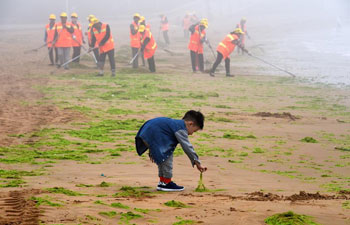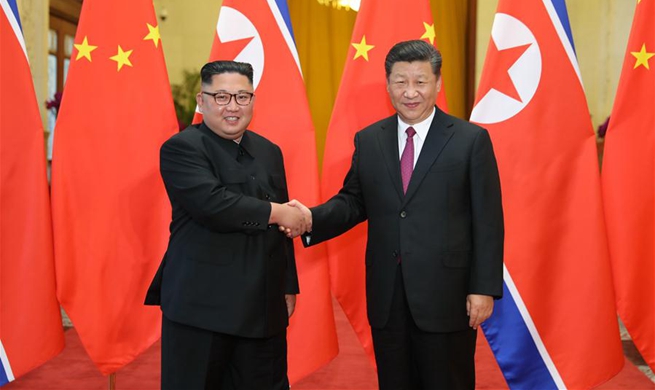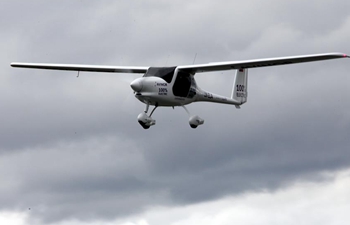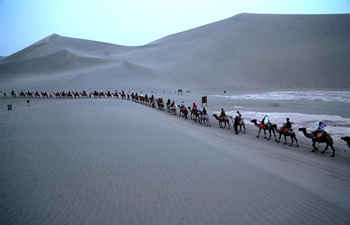By Xinhua Writers Cao Kai, Fan Shihui
SHIJIAZHUANG, June 20 (Xinhua) -- Fifty years after starting experiments on hybrid wheat, Wang Zhen is happy to see a bumper harvest this year.
The 80-year-old farmer from Linzhang County, north China's Hebei Province, rode his tricycle to the fields to watch machines reap 15 mu (1 hectare) of wheat over the past week.
The average yield of the hybridized wheat, a produce of wheat and twitch-grass, is 452 kg per mu, 150 kg more than that of local varieties, according to Wang, who is seen by his peers as crazy.
Wang's wheat, which is called "wheat with massive ears," has 90 ears, more than twice of that of ordinary wheat. He said it also has a higher protein content and is more resistant to lodging and diseases.
Wang, who has only a senior high school education, said he has discovered seven species of wild grass that can be hybridized with wheat. Out of the 15 mu of wheat he planted, 5 mu is wheat hybridized with twitch-grass and the other 10 mu is hybridized with other wild grasses.
Distant hybridization, between different species belonging to the same genus, is a global challenge that even scientists are not eager to attempt. Wang said he was motivated by a government slogan in the 1950s to develop China into the world's first country with a stable and high grain yield after the country was hit by famine and feeding the population was a big problem.
"I wanted to breed quality wheat with high yields through hybridization, making my own contribution to the country," said Wang, who quit a post office job to work as a technician at a farm.
Wang has hybridized several different varieties of wheat but failed to produce a variety with better yields. He then had the bold idea to hybridizing wheat with twitch-grass, which has bigger ears as well as strong stems and is more resistant to diseases.
Wang read all the genetics and breeding books he could get his hands on and continued experiments with hybridizing wheat despite derision from local farmers and scientists. He managed to produce his first hybrid wheat seed in 1977 and planted it in a flowerpot.
With continuous breeding and optimizing, Wang began to plant the hybrid wheat on a large scale in 2012 with the help of his neighbor Chen Fulin, who offered 5 mu of land.
"I didn't want to see him take his research to the grave," said Chen.
Developing hybrid wheat is costly. To cover land rental and labor costs, Wang had planted vegetable greenhouses and kept bees. He also works part-time as a security guard.
Although yet to get official certification to be promoted nationwide, Wang's hybrid wheat has already played a role in Linzhang.
"Wang's wheat is good breeding material. A hybrid wheat variety we are promoting now has his wheat as the male parent," said Jin Guangxian, a senior agro-technician from the county agriculture and animal husbandry bureau.
Despite decades of effort, it still has a long way to go for Wang's hybrid wheat to be a quality variety that can be promoted on a larger scale, said a professor from the China Agricultural University who requested anonymity.
"The formation of a quality variety needs strict examination procedures," he told Xinhua. "You have to figure out how the variety should be planted, including seeding rate, water demands, disease prevention and control."
As Wang's hybrid wheat is not a mature variety, he will keep parts of the yield for family use and sell the rest to the market as normal wheat.
For Wang, the biggest concern now is his health.
"If I pass away, nobody will carry on my research," he said, adding that it takes at least six to 10 years to make achievements in breeding.
"I will donate my research to the country and let scientific institutions continue the research on distant hybridization," he said.






